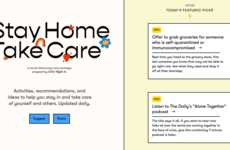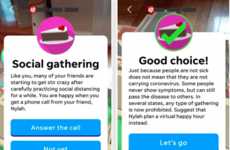
The Social Distance Squad Shares the Expertise of Kids with CF
Laura McQuarrie — July 27, 2020 — Lifestyle
References: socialdistancesquad & adsoftheworld
It's essential for people with cystic fibrosis to keep a safe distance from others at all times, which is why The Social Distance Squad was established to help educate people on the importance of keeping a safe distance from others, especially during a global pandemic. The group of teens with cystic fibrosis are branded as "social distancing experts" and they're on a mission to help teens who are struggling to cope with the realities of COVID.
As individuals with cystic fibrosis are required to social distance due to their genetic condition, this program developed by Area 23 (an FCB Health Network company) offers tips for beating boredom and feeding creativity, as well as bonding and dating others safely.
Image Credit: Area 23
As individuals with cystic fibrosis are required to social distance due to their genetic condition, this program developed by Area 23 (an FCB Health Network company) offers tips for beating boredom and feeding creativity, as well as bonding and dating others safely.
Image Credit: Area 23
Trend Themes
1. Teenage Health Experts - Creating opportunities for teens with unique health experiences or requirements to share their expertise and educate others could lead to new ways of approaching healthcare and wellness education.
2. Youth-led Education - Empowering young people to lead educational efforts about pandemic safety could not only provide valuable information, but also build leadership qualities and encourage community involvement.
3. Social Distancing for Mental Health - Recognizing the mental health impacts of social distancing and finding creative ways to connect young people safely can foster resilience and promote mental wellness during challenging times.
Industry Implications
1. Healthcare - Incorporating more patient-led education and support initiatives into healthcare systems could improve patient outcomes and experiences while expanding opportunities for patient engagement.
2. Education - Integrating pandemic safety education led by youth and teens into school curriculums or extracurricular programs could create impactful learning experiences and prepare students for future challenges.
3. Mental Health - Developing innovative tools and resources to help individuals cope with social distancing-related mental health concerns and stay connected to others could improve the overall wellbeing of both patients and healthcare consumers.
4.1
Score
Popularity
Activity
Freshness























